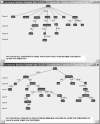Complex questions asked by defense lawyers but not prosecutors predicts convictions in child abuse trials
- PMID: 18633698
- PMCID: PMC2856470
- DOI: 10.1007/s10979-008-9148-6
Complex questions asked by defense lawyers but not prosecutors predicts convictions in child abuse trials
Abstract
Attorneys' language has been found to influence the accuracy of a child's testimony, with defense attorneys asking more complex questions than the prosecution (Zajac & Hayne, J. Exp Psychol Appl 9:187-195, 2003; Zajac et al. Psychiatr Psychol Law, 10:199-209, 2003). These complex questions may be used as a strategy to influence the jury's perceived accuracy of child witnesses. However, we currently do not know whether the complexity of attorney's questions predict the trial outcome. The present study assesses whether the complexity of questions is related to the trial outcome in 46 child sexual abuse court transcripts using an automated linguistic analysis. Based on the complexity of defense attorney's questions, the trial verdict was accurately predicted 82.6% of the time. Contrary to our prediction, more complex questions asked by the defense were associated with convictions, not acquittals.
Figures
References
-
- Brennan M, Brennan RE. Strange language: Child victims under cross examination. Riverina Murray Institute of Higher Education; Wagga Wagga, Australia: 1988.
-
- Bruck M, Ceci JS, Hembrooke H. Reliability and credibility of young children's reports. The American Psychologist. 1998;53(2):135–151. doi:10.1037/0003-066X.53.2.136. - PubMed
-
- California v. Green 399 U.S. 149 1970.
-
- Cashmore J, DeHaas N. The use of closed-circuit television for child witnesses in the act. 1992. Australian Law Reform Commission Research Paper No. 1.
-
- Chaski CE. Forensic linguistics: An introduction to language, crime, and law. The International Journal of Speech, Language and Law. 2004;11:298–303.
MeSH terms
Grants and funding
LinkOut - more resources
Full Text Sources
Medical

